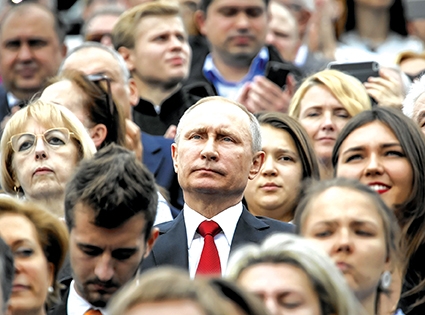A Different Perspective on Russia
Op-Ed
For the past several months, my argument on Russia has been that Vladimir Putin’s government currently faces major challenges both at home and abroad. In terms of foreign policy, Russia experienced several serious failures. In 2014, when the Euromaidan took place and Russia grabbed Crimea and supported separatists in Donbass, Kiev became unequivocally pro-western in its foreign policy course. In the same year, Moldova, Ukraine, and Georgia all signed EU association agreements and stepped up military cooperation with NATO members and other western states. Moreover, over the past few years of Putin’s rule, it has become clear that Russian influence in the strategically important Central Asian region is receding. It is true that Russia remains a predominant military power with military bases in Tajikistan and Kyrgyzstan, but on the economic front, China has cemented its dominance. China has even made inroads into the security realm by holding exercises with the Tajik and Kyrgyz militaries.
Russia is feeling pressure from the US and the EU. It is unlikely that the sanctions imposed on Russia will be lifted anytime soon and Putin’s gamble to revive far-right parties across Europe has largely failed for the moment.
I also argued that it is getting more and more difficult for Russians to understand why Putin’s presidency should go on for another six years. Next year, Putin’s rule, which has already lasted 17 years, will become the longest since Stalin’s. There is already an entire generation of young Russians who have known only Putin as the country’s leader.
All these arguments sound quite logical, but they do represent a decidedly western perspective. In this piece, I would like to take a slightly different perspective, where Russian ‘stuff’ is seen from a non-conformist perspective as what we lack in our analyses is the aspiration to avoid pure western assumptions which are simply not eligible in Russia.
How to deal with the Russian aggression and the Kremlin’s general assertiveness in the former Soviet space? What should be done with Russia’s moves in Syria and how should Europe counter Russian propaganda? A quick look at daily news coverage and subsequent analytical pieces produced across much of the world reveals that a partial answer to the above questions is standard thinking or even a theory that a drop in world oil prices, coupled with Western economic sanctions, will cause enough economic and social unrest in Russia to become a threat to Putin's government.
Indeed, the logic is correct and to further support this thinking there are numerous protests happening across Russia by Aleksey Navalny’s followers (particularly youngsters), criticizing the central government, the unresolved attacks on journalists and life-threatening actions taken against human rights defenders. One could find this as a certain indicator how unstable Russia has become and that there will be future negative developments for the Russian government.
I would like to put here a different view on how the Russian government actually responds to problems of people. If in the west sovereign power actually emanates from large masses of the population, in Russia it is different. Russian governments have been more rigid, relying on more coercive measures to control the vast country. Thence comes the Kremlin which worries little about large anti-government manifestations.
Another big misunderstanding is that when we see coordinated demonstrations across the Russian landmass, we often say that something is brewing in the country. In fact, we even think that this is a barometer of discontent. But to tell the truth, even Navalny’s country-wide protests are so minuscule that they do not represent even a quarter of the population.
For years, the idea was that western sanctions passed against Russia because of its actions in Ukraine would lead to serious problems inside the country, or even disruption in the elite. True that the number of poor in Russia has risen. In the West, this would lead to mass protests, immediate change of governments, etc. However, priding themselves on how long they suffered under western oppression - under Napoleon, Hitler, even during the Cold War - the Russians have the logic that everyone is against Russia. This actually helps to unite people against external enemies and lay out counter-measures.
Sacrifice for the ordinary Russian is something different from what is considered in the West. Throughout history, Russians (and their governments) could have burned their own cities (even spiritual capital Moscow in 1812 when Napoleon entered it), leaving the besieged people for months or longer without any actual aid, and taking lesser care of those public services and democratic institutions which are deemed essential in the West.
My point is that even though Putin wants to have rating approval among the populace, his power still does not entirely depend on the population’s liking. On the contrary, strong state structures (such as police, internal affairs troops, or the newly-created National Guard), self-gratify the feeling among Russians that West is against them.
Emil Avdaliani












